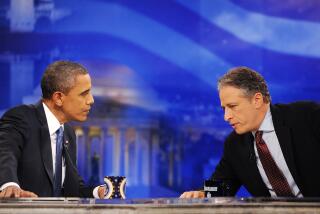Out to Topple Koppel : Television: CBS enters the ring in a fight for the late-night audience. News fans will be the winners as the Big Three and CNN duke it out.
- Share via
Ted Koppel’s decade-old ABC institution, “Nightline,” is about to face some first-class news competition.
Starting Monday at 11:30 p.m., CBS will pit Charles Kuralt and Lesley Stahl against “Nightline” with their own half-hour series, “America Tonight.”
Just as “Nightline” grew out of reports on the Iran hostage crisis, the Kuralt-Stahl series is a product of their specials on the Persian Gulf showdown.
And for TV, the new CBS challenge to Koppel is an opening shot in a suddenly expanding network battle for the late-night--in fact, all -night--audience.
The impact of Ted Turner’s 24-hour CNN on the Big Three has never been so pronounced.
By January, the news departments of ABC and NBC plan to join CBS--which already has “Nightwatch” in the wee hours--in offering programming that lasts until dawn.
This week’s CBS confirmation of the Kuralt-Stahl series, plus the announcements of the ABC and NBC expansion plans, are significant network steps.
The result is hog heaven for news junkies. But it’s also a major move by the declining Big Three to woo new viewers, reap untapped profits and win praise for worthy shows.
Kuralt acknowledges that he and Stahl may have until only the end of the year to make their series a ratings winner. Some believe their nightly program may be strictly a stopgap until CBS finds a high-profile entertainment alternative.
“But I think this series will last,” Kuralt says. “There’s an audience for it, even against Ted’s show. I think we’ll do things so interestingly that people will find our program just as compelling as Ted’s.”
Kuralt’s job is to turn in “one solid piece each night. That’s what they want me to do.”
And that means his trademark “On the Road” pieces are out for now--no time--although he’ll continue his distinguished “Sunday Morning” series.
While Kuralt will be based in New York, Stahl will remain in Washington, where she will also continue as anchor of “Face the Nation.”
Koppel thinks of Kuralt and Stahl as “fine professionals, and I’m sure they’ll do a fine broadcast,” but he also knows that other factors probably encouraged CBS to start the new series.
Most important, CBS’ “Pat Sajak Show” failed, and late-night has since been a void for the network, prompting some of its stations to look toward syndicated replacements such as the Arsenio Hall program.
“CBS has tried a number of different things over the past few years and none of them has worked,” Koppel says.
But, he adds, because “this is a time of high news interest in the Persian Gulf,” it’s a good move to go with something like the Kuralt-Stahl series.
Says Koppel: “I think that what CBS is doing is an acknowledgement that whatever they’ve done hasn’t succeeded, and if you’re going to wind up with a smaller audience--as all networks are--you might as well get credit for what you do.”
As for ABC’s planned 1-6 a.m. newscast aimed for a Jan. 7 start, and NBC’s launch the same month of a 24-hour service providing stories for its local stations, Koppel says:
“It seems to me the networks are amortizing their expenses and using the only time they have left. Given the success of CNN, it was inevitable.”
Koppel figures the networks may have been influenced in their expansion by the fact that CNN has been able “to make a go of it . . . even though CNN, in its most-watched hours, doesn’t match network audiences in their least-watched hours.”
But CNN executive vice president Ed Turner says he’s “mystified” by the networks’ new late-night projects:
“Where’s the appetite? News has such a narrow audience anyway, except in crisis, and overnight it really falls off. And you’ve got CNN and Headline News and C-SPAN and maybe CNBC--and probably all-news radio in major markets.
“And now along comes NBC and ABC, plus CBS with its (Kuralt-Stahl) half-hour and whatever it does with Charlie Rose’s old show (‘Nightwatch’).”
Rose, however, and Linda Ellerbee--both famous names in overnight TV--believe that there’s a strong appetite for news in the wee hours.
“I know there’s an audience out there,” says Rose, who left “Nightwatch” this year to become anchor of Fox Broadcasting’s new “Personalities” series.
“There’s a community of people in the middle of the night who want to be informed, engaged. They’re looking for a companion, looking for stories. I’m very pleased to see (the expansion) happening. It’s just television pushing the frontiers.”
Ellerbee, anchor of the “NBC News Overnight” series in the early 1980s, recalls:
“When we were canceled, we were told there simply was not an audience. And we said, ‘Oh yes, there is. You’re not measuring it properly.’ And then later on, the networks started saying they didn’t think overnight audiences were being measured properly. I think the audience was always there.”
But now, she says, “The threat is bigger from CNN. Isn’t it funny how we’ve seen it go from ‘CNN will never last’ to ‘We want to be CNN’?”
Each network has other reasons for expanding its late-night news. CBS is desperate to stop affiliate defection--and hopes programs such as the Kuralt-Stahl series will carry over viewers to the network’s low-rated “This Morning” show with Harry Smith and Paula Zahn.
ABC, which says its 1-6 a.m. project still must win budget approval, is developing the show at the request of its stations. It plans to use two anchors, and affiliates would be able to carry from two to five hours, produced in 30-minute packages--an apparent challenge to CNN’s Headline News channel and its format.
NBC is the strongest network in late-night with the Johnny Carson, David Letterman and Bob Costas shows. Its 24-hour news feed will simply supply its stations with raw material. But an NBC source says, “Once the service is up and running, we can begin to examine program possibilities. Everyone’s getting a smaller piece of the TV pie, and we’re looking for different sources of revenue anywhere we can.”
John Rohrbeck, general manager of KNBC Channel 4, says he’s strongly in favor of around-the-clock programming: “There’s an audience out there. A station must be on the air 24 hours a day. Any time a station signs off, it has to jump-start itself again.”
More to Read
The biggest entertainment stories
Get our big stories about Hollywood, film, television, music, arts, culture and more right in your inbox as soon as they publish.
You may occasionally receive promotional content from the Los Angeles Times.










